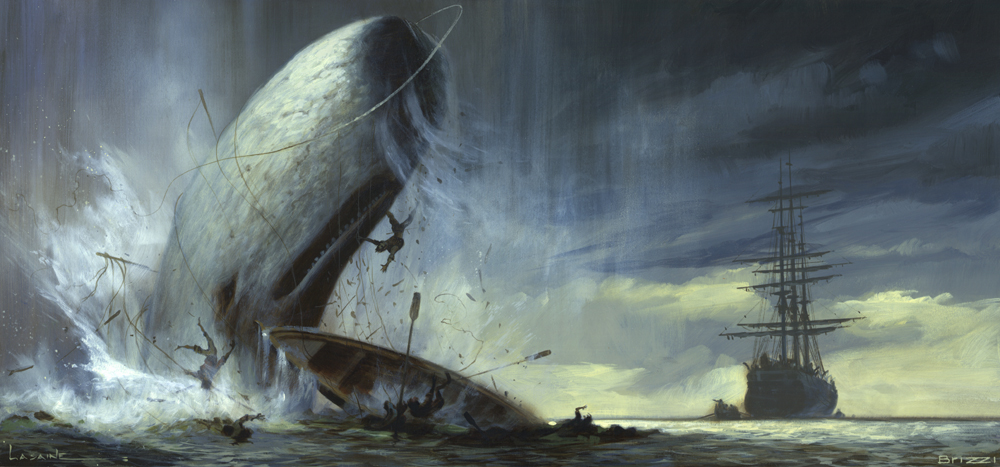Thursday, October 23, 2008
posted by Steve Tompkins
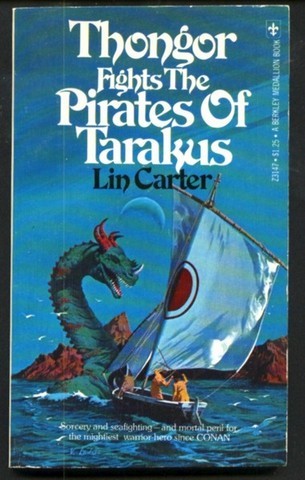
The three inevitables: Death, taxes, and grappling with the shade of L. Sprague de Camp. I never cease to be concussed by the adamantine certainty of de Camp’s Final Guard that he and only he could ever have been Conan’s salvager and salvation, the Last Best Hope of Howardkind. That REH’s stories, the dark and bloody American frontier of modern heroic fantasy, could never have cut it on their own. That unless bulked-up and buttressed by hardcases like Conan the Buccaneer, the authentic tales would have been shunned by the scads of anthologist claim-stakers and repackaging-prospectors who flocked to the Klondike that pulp fiction became in the late Sixties and early Seventies.

(Continue reading this post)
Friday, October 17, 2008
posted by Steve Tompkins
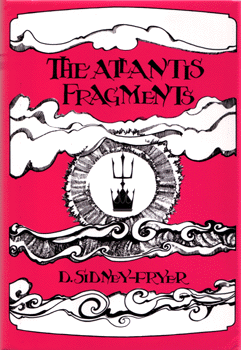
Then suddenly fire burst from the Meneltarma, and there came a mighty wind and a tumult of the earth, and the sky reeled, and the hills slid, and Númenor went down into the sea, with all its children and its wives and its maidens and its ladies proud; and all its gardens and its halls and its towers, its tombs and its riches, and its jewels and its webs and its things painted and carven, and its laughter and its mirth and its music, its wisdom and its lore: they vanished for ever.
J.R.R. Tolkien, Akallabêth
Atlantology, which boasts a Donnelly and a Donovan, is also blessed with a Donald, Donald Sidney-Fryer. Cimmerian readers know him as one of the journal’s triumvirate of poets laureate alongside Richard Tierney and Darrell Schweitzer, a translator, and an essayist who won a 2008 Hyrkanian Award for his “Robert E. Howard: Epic Poet in Prose.” Students of weird fiction know him as a contributor to The Dark Barbarian, the editor of the Timescape Clark Ashton Smith collections The City of the Singing Flame, The Last Incantation, and The Monster of the Prophecy, and the author of The Sorcerer Departs: Clark Ashton Smith (1893-1961), the founding document of Klarkashtonian Studies. His website heralds him as “the Last of the Courtly Poets & Northern California’s Only Neo-Elizabethan Poet-Entertainer.” And The Atlantis Fragments, which collects Mr. Sidney-Fryer’s three sets of Songs and Sonnets Atlantean, confirms that he is a direct descendant of mythohistorical figures like Atlas I, called Pharanomion (“the founder”, the Northron-harried Poseidon II, and Atlantarion the poet-king.
(Continue reading this post)
Tuesday, October 14, 2008
posted by Leo Grin

In Charles Saunders’ latest blog post (click here and then select “Blog”), he dwells for a spell on one aspect of the rich tapestry of culture and myth that has fueled his Imaro and Dossouye tales. It’s a peek into why his worldbuilding is so effective and immersive. Budding fantasy writers take heed.
Also check out Charles’ Forum for a neat letter from a native African currently living in Sweden who likes both Saunders and REH.
Thursday, October 9, 2008
posted by Steve Tompkins
It was cased all in bright armour sealed with heavy rivets, a round helmet clamped over the top half of its skull, eyes glinting beyond a thin slot. It grunted and snorted, sounds loud as a bull, iron-booted feet thudding on the stone as it thundered forwards, a massive axe in its iron-gloved hands. A giant among Shanka. Or some new thing, made from iron and flesh, down here in the darkness.
Its axe curved in a shining arc and the Bloody-Nine rolled away from it, the heavy blade crashing into the ground and sending out a shower of fragments. It roared at him again, maw opening wide under its slotted visor, a cloud of spit hissing from its hanging mouth. The Bloody-Nine faded back, shifting and dancing with the shifting shadows and the dancing flames.
That Frazetta-grade dream of a red meeting is from Joe Abercrombie’s 2007 novel Before They Are Hanged, and so is this one:
He came on closer, this shadow, and he took on more shape, and more, and the clearer he got, the worse grew the fear.
He’d been long and far, the Dogman, all over the North, but he’d never seen so strange and unnatural a thing as this giant. One half of him was covered in great plates of black armour — studded and bolted, beaten and pointed, spiked and hammered and twisted metal. The other half was mostly bare, apart from the straps and belts and buckles that held the armour on. Bare foot, bare arm, bare chest, all bulging out with ugly slabs and cords of muscle. A mask was on his face, a mask of scarred black iron.
He came on closer, and he rose from the mist, and the Dogman saw the giant’s skin was painted. Marked blue with tiny letters. Scrawled across with writing, every inch of him. No weapon, but he was no less terrible for that. He was more, if anything. He scorned to carry one, even on a battlefield.
In the two-years-plus since we lost David Gemmell at an intolerably early age, nothing, absolutely nothing, has so reassured me about the future of heroic fantasy as Abercrombie’s sequence The First Law: The Blade Itself (2006), Before They Are Hanged (2007), and Last Argument of Kings (2008). All 3 white-knucklers are now available in the U. S. from the Pyr imprint of Prometheus Books.
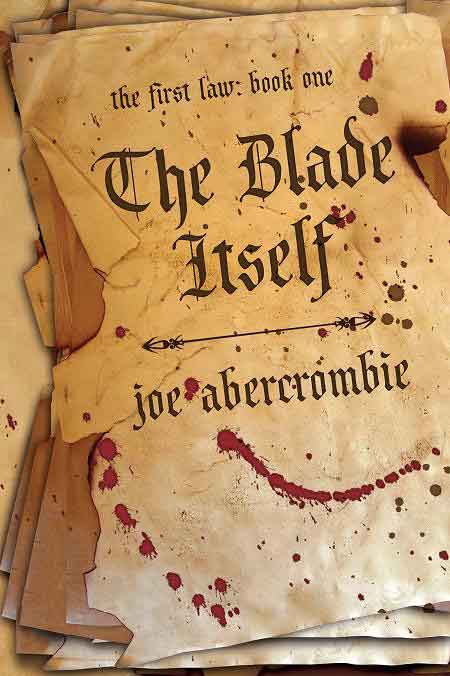
(Continue reading this post)
Thursday, October 2, 2008
posted by Leo Grin

Here’s an interesting blog post on Howard that is apparently four years old, yet I’d never come across it before. In between blasts of the too-cool-for-school style so common to pop-culture bloggers, you’ll find some solid red meat to chew on.
The ideological comparison with Plath is interesting. I’ve always liked her tombstone, which quotes the Hindu adage, “Even amidst fierce flames, the golden lotus can be planted.” One young woman, writing of Plath on her blog, nails the appeal — what one might call the Howardian essence — of her haunting verse:
Her poems are a world of fairytales gone terribly wrong…Her poems are unforgettable because they are, like her, at once violent and vulnerable. They speak, at once, to both the child and the beast within us.
Just so. The violent, vulnerable Texan would have heartily agreed.
Wednesday, October 1, 2008
posted by Leo Grin

There’s a new genre accolade in the ring, The David Gemmell Legend Award, set to be presented each year to the author of the best heroic fantasy novel. It sounds as if this will go down similar to the World Fantasy Award, with voters helping to make a shortlist and then a panel of judges picking the winner.
The whole works is just getting started, but they are building a fantasy community on their site complete with member pages, registration for periodic updates, and a forum where all of the nominees are subjects for discussion. All in all, a cool way to help preserve Gemmell’s memory. Hope it works out for them. (hat tip Ansible via Don Herron)
Tuesday, September 30, 2008
posted by Leo Grin

Those of use who bemoan the occasional spectacle of this-or-that two-bit American critic clumsily attempting to take Robert E. Howard out to the woodshed can take heart in remembering that no matter how elitist or arrogant or divorced from reality a particular critic appears, there always — always — is an even bigger and more clueless snob waiting just around the bend:
STOCKHOLM, Sweden (AP) – The man who announces the Nobel Prize in literature says the United States is too “insular” and ignorant to compete with Europe when it comes to great writing.
In an exclusive interview with The Associated Press, Horace Engdahl said Tuesday that “Europe still is the center of the literary world.”
Engdahl is the permanent secretary of the Swedish Academy, which selects the literature prize winner. He is expected to announce the winner in the coming weeks.
Engdahl says the U.S. “is too isolated, too insular” and doesn’t really “participate in the big dialogue of literature.”
Since Japanese poet Kenzaburo Oe won in 1994, the selections have had a distinct European flavor. The last American winner was Toni Morrison in 1993.
Mr. Engdahl really thinks that by making such statements he is leveraging the enormous clout and gravitas of the Nobel Prize and marshaling that august legacy to the defense of literary Europe. What he’s really doing is squandering what little reputational capital the Prize has left and continuing its long continental drift into irrelevance. Just saying something doesn’t make it so, and sometimes a prize can over time become a scarlet letter. American literature has as little to fear from Sweden’s literary aesthetes as our military does from their Home Guard.
Steve adds: The late Norman Mailer’s zeitgeist-wrassling was never to everyone’s taste (although some visitors to this site would be startled by the ambition and multiple adrenaline spikes of his boxing journalism), but the best of his fiction (The Naked and the Dead, Why Are We In Vietnam?) and the best of his nonfiction (“Superman Comes to the Supermarket,” The Armies of the Night, Miami and the Siege of Chicago, The Executioner’s Song) should easily have notched him a Nobel. Rumor was, he was blackballed year after year after year by at least one academician, as also occurred with Graham Greene. Guess there’s more than one kind of Stockholm Syndrome…
Tuesday, September 30, 2008
posted by Leo Grin
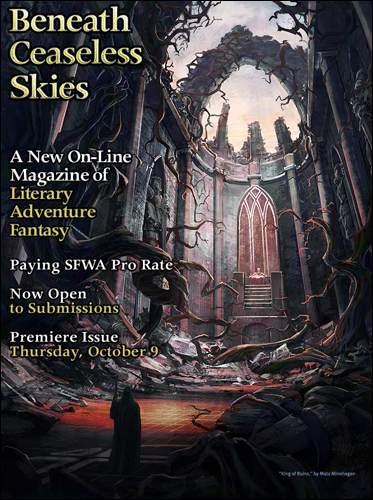
Over here we have a new online S&S fiction magazine, titled Beneath Ceaseless Skies, dedicated to publishing “literary adventure fantasy,” what they also call “modern traditional fantasy” or “literary swords and sorcery.” You can read a lengthy interview with editor Scott Andrews here. What makes this project interesting is
A) It’s free to subscribe to.
B) It’s set to appear every two weeks.
C) They are going to pay their authors the comparatively magnificent sum of five cents a word.
and
D) They intend to podcast audio versions of many of their published stories.
How they intend to pay five cents a word while giving the stories away for free is an open question, as is how they intend to deal with the tsunami of awful slush that is sure to soon overwhelm their editorial staff. My guess is they might soon run out of gas and start coming out less frequently and/or paying less, but I’m perfectly willing — hoping! — to be proven wrong. Indeed, if they succeed they will be the only S&S market out there worthy of the name: one that comes out often, always remains open to submissions, and consistently provides stories of a superior literary quality. I consider the REH/HPL/CAS brands of prose poetry to be essential elements of the fantasy I praise most highly, and it sounds as if the editors at Beneath Ceaseless Skies share that penchant.
So best of luck to Scott Andrews and the rest of the BCS gang. Head on over to their site and subscribe — the first issue is set to appear on Thursday October 9. And check out their forum, which will undoubtedly grow as the magazine gains readers and takes off.
Tuesday, September 30, 2008
posted by Leo Grin
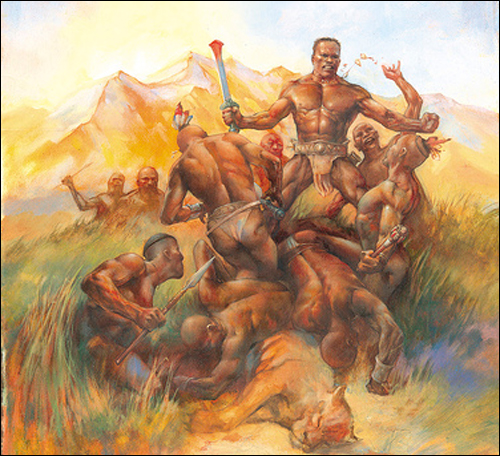
Our favorite purveyor of Sword & Soul has added a great new post to his blog, wherein he casts his Imaro novels with a selection of Hollywood’s best and brightest. Just click over to Charles’ website and select BLOG from the menu on the left — the post in question is titled “A Nyumbani Facebook.” Great fun. His selection of Gary Coleman as Pomphis reminds me of the time I bumped into Coleman here in Los Angeles circa 1998 or so. I was waiting in line at a Koo Koo Roo restaurant here in Marina del Rey, and the diminutive actor strolled in to pick up a take-out order. No one bothered him, but there was a lot of staring at the Mutt and Jeff absurdity of his standing next to me, a six-foot-eight Jolly Green Giant.
Charles also has a new menu item on his site marked RECOMMENDED, in which he has listed a number of books and authors he’s read recently, all of whom he’s jazzed enough about to share with his own readers. Fans of Howard’s boxing tales — an ever-growing group which includes virtually everyone who hunts them down and reads them — will want to pick up the new biography of the great Golden Age pugilist Sam Langford that Charles discusses in one of his posts.
Finally, Charles tells me that the long-awaited Imaro III is almost ready to be released by Brother Uraeus’ Sword & Soul Media — The Cimmerian will let you know as soon as it hits the mean streets (you can get the first two Imaro novels, Imaro and The Quest for Cush, both completely revised and updated, at Amazon). And if you haven’t picked up Sword & Soul Media’s first release, Dossouye, what the hell are you waiting for? If I’ve said it once I’ve said it a hundred times: Saunders’ mythic, sorcerous, fantasticated Africa — lushly imagined with liberal amounts of thoroughly enchanting real-life history, culture, and folklore, and sprinkled with bloody droplets of Howardian fairy-dust — constitutes the most effective attempt at subcreation since Tolkien’s Middle-earth. Pick whatever nits you wish about plotting, pacing, wording, whatever — the world-building is that good.
Wednesday, September 24, 2008
posted by Steve Tompkins
I’m going to let a September 22 Variety story speak, offensively, for itself, because words fail me, unless it be to note that the verb to revere clearly doesn’t mean what I thought it did:
Universal Pictures has made a splashy preemptive buy of “Moby Dick,” a reimagining of the Herman Melville whale tale that Timur Bekmambetov (“Wanted”) will direct. Studio paid high six figures to Adam Cooper and Bill Collage to pen the screenplay.
The writers revere Melville’s original text, but their graphic novel-style version will change the structure. Gone is the first-person narration by the young seaman Ishmael, who observes how Ahab’s obsession with killing the great white whale overwhelms his good judgment as captain.
This change will allow them to depict the whale’s decimation of other ships prior to its encounter with Ahab’s Pequod, and Ahab will be depicted more as a charismatic leader than a brooding obsessive.
“Our vision isn’t your grandfather’s Moby Dick, ” Cooper said. “This is an opportunity to take a timeless classic and capitalize on the advances in visual effects to tell what at its core is an action-adventure revenge story.”
Scott Stuber is producing with Jim Lemley and Cormac and Marianne Wibberley.
Both Stuber and Bekmambetov have deals at Universal. Bekmambetov will look to apply the visual flourish he displayed on the U summer hit Wanted.
“We wanted to take a graphic novel sensibility to a classic narrative,” said Collage.
